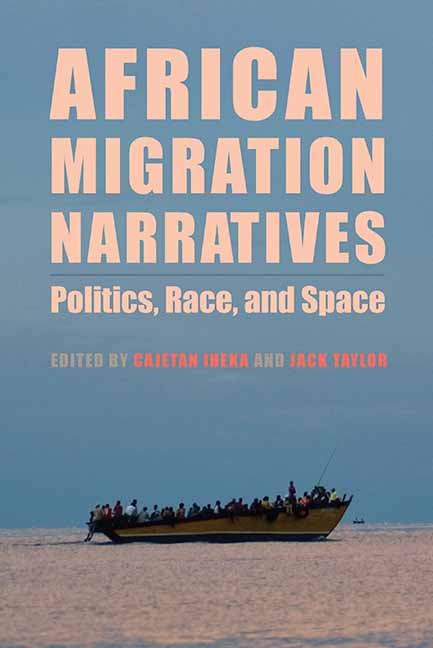Book contents
- Frontmatter
- Contents
- Acknowledgments
- Introduction: The Migration Turn in African Cultural Productions
- Part One African Migration on the Screen: Films of Migration
- 1 Harragas, Global Subjects, and Failed Deterritorializations: The Tragedies of Illegal Mediterranean Crossings in Maghrebi Cinema
- 2 Nollywood Comedies and Visa Lotteries: Welfare States, Borders, and Migration as Random Invitation
- 3 Accented Cinema: The Context of Nollywood
- 4 Migrations and Representations: The Cinema of Griot Dani Kouyaté
- Part Two Forgotten Diasporas: Lusophone and Indian Diasporas
- Part Three Migration against the Grain: Narratives of Return
- Part Four Migration and Difference: Indigeneity, Race, Religion, and Poetry at the Margins
- Bibliography
- Notes on Contributors
- Index
3 - Accented Cinema: The Context of Nollywood
from Part One - African Migration on the Screen: Films of Migration
Published online by Cambridge University Press: 26 July 2019
- Frontmatter
- Contents
- Acknowledgments
- Introduction: The Migration Turn in African Cultural Productions
- Part One African Migration on the Screen: Films of Migration
- 1 Harragas, Global Subjects, and Failed Deterritorializations: The Tragedies of Illegal Mediterranean Crossings in Maghrebi Cinema
- 2 Nollywood Comedies and Visa Lotteries: Welfare States, Borders, and Migration as Random Invitation
- 3 Accented Cinema: The Context of Nollywood
- 4 Migrations and Representations: The Cinema of Griot Dani Kouyaté
- Part Two Forgotten Diasporas: Lusophone and Indian Diasporas
- Part Three Migration against the Grain: Narratives of Return
- Part Four Migration and Difference: Indigeneity, Race, Religion, and Poetry at the Margins
- Bibliography
- Notes on Contributors
- Index
Summary
Critical scholarship on Nollywood has demonstrated its significance for African and global cinema. With the upsurge in theoretical advancements and detailed film analyses drawing primarily on cultural studies and reception studies, the future of Nollywood scholarship looks quite promising. The transnational dimensions of Nollywood are crucial to these recent advancements in film studies scholarship. Recently issues of exile, the black diaspora, immigration, and migration have become staples for filmmakers who live outside Nigeria. Studies by Jonathan Haynes, Sophie Samyn, Claudia Hoffman, Onookome Okome, and Paul Ugor, for example, have mobilized critical categories for understanding what exilic filmmaking entails in the context of Nollywood, categories that I mobilize throughout the course of this chapter. Many Nollywood films concerned with migration and exile detail the deplorable state of the homeland and highlight the reasons as to why there is mass movement of Nigerian immigrants to surrogate societies in the First World.
This chapter examines Chineze Anyaene's Ije: The Journey by paying acute attention to the issues of exile, migration, and the diaspora showcased in the film. Chineze Anyaene has created some of the best epic folktale films and is perhaps the most successful Nigerian filmmaker living abroad. Upon her enrollment for a master's degree program in directing at the New York Film Academy, she became the first student in the history of the New York Film Academy to shoot on a Kodak 35mm camera. She is the founder of Xandria Film Outfit in Lagos, Nigeria. Ije: The Journey is a well-made film that centers on two sisters’ “unbreakable bonds of loyalty and the power of the human spirit.” The film features two of the leading lights of contemporary Nigerian cinema: Genevieve Nnaji and Omotola Jalade Ekeinde. Both actresses have acquired a reputation for their stellar performances on screen. Genevieve Nnaji, for example, had a lead role in the film adaptation of Chimamanda Ngozi Adichie's Half of a Yellow Sun. Nigerian female actresses are emerging in large numbers and are able to pursue more complex roles as a result of these two colossal Nollywood ambassadors.
Migration, exile, and living in diasporic locations are common among African people due largely to bad governance on the continent, which has led to the pursuit of opportunities abroad. In Nigeria, for instance, youth routinely search for avenues to escape economic hardship by seeking opportunities abroad.
- Type
- Chapter
- Information
- African Migration NarrativesPolitics, Race, and Space, pp. 55 - 67Publisher: Boydell & BrewerPrint publication year: 2018

